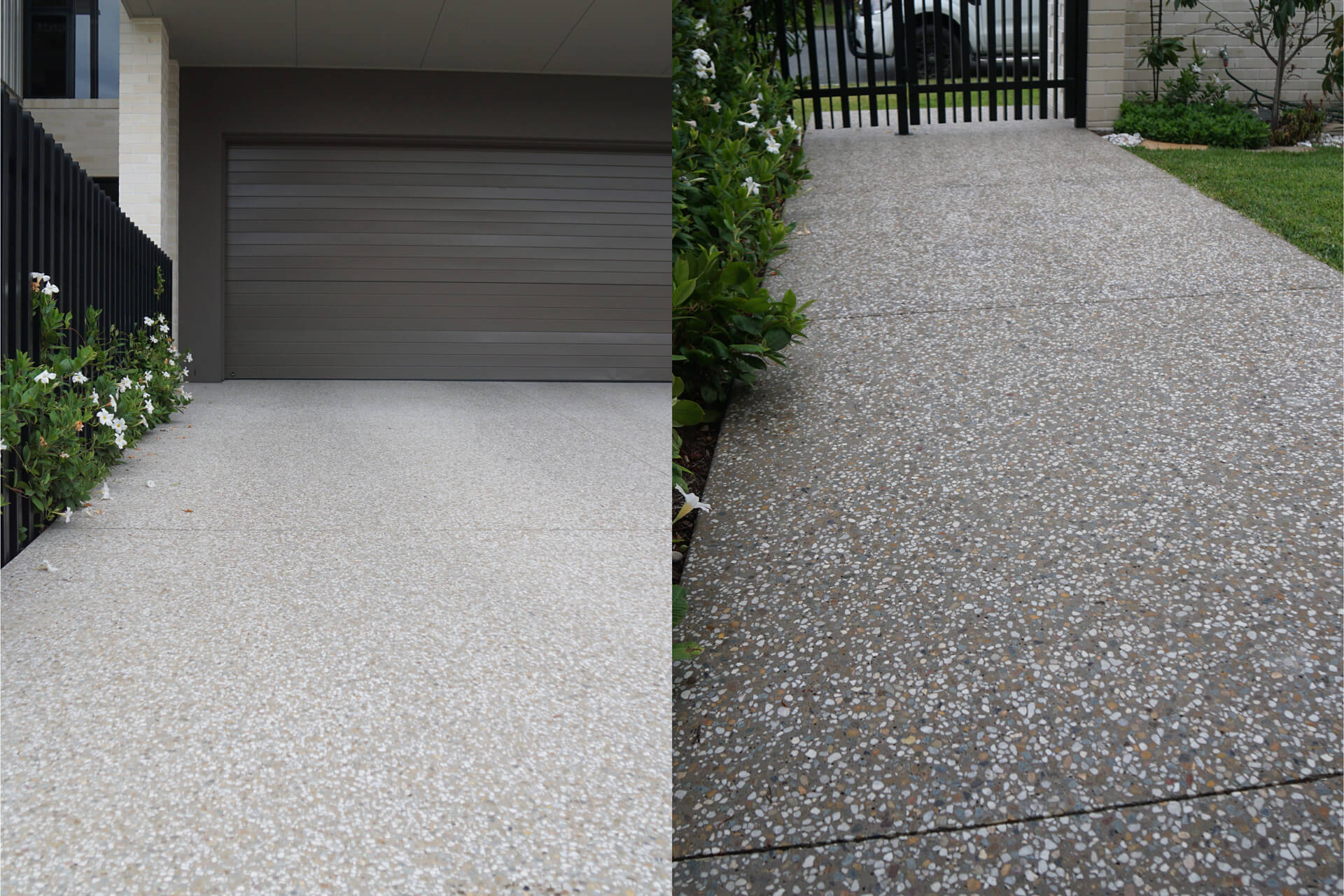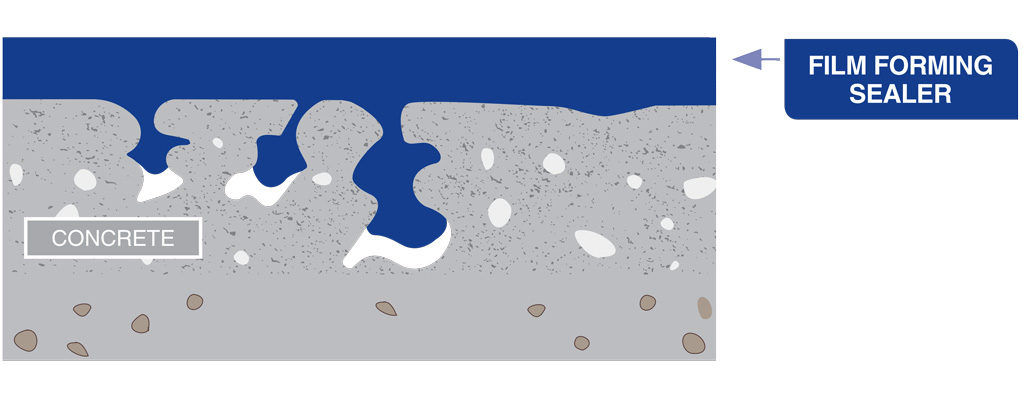The benefits and our best practice cleaning guidelines
The benefits of sealing your concrete
Concrete can be described as a hard sponge that soaks up oil and water-based spills. Easily marked by tires and outdoor elements, it is important to seal the surface, so it looks beautiful year-round. The other benefit to sealing concrete is improved cleaning and maintenance. Sealers prevent spills and debris from staining the surface and make it much easier to clean. They also enhance the surface and depending on the type of sealer chosen, a natural matte finish or rich colour can be achieved. Keep reading to understand the types of sealers, the benefits of each and how they can reduce the maintenance and care required for your concrete.
Below are two types of sealers you can choose from to protect your concrete surface. The left is a penetrating sealer that maintains the natural finish of the surface. The right image is a film-forming and surface enhancing sealer.
Penetrating sealers
Penetrating sealers retain a natural finish and protect the surface from water and stains. The way this type of sealer works is by filling the pores of the concrete to prevent pollutants from penetrating into the surface. For example, an oil spill will sit on top of the surface for longer, allowing you more time to clean the spill and to prevent staining. If you want to keep the natural colour and finish of your surface, penetrating sealers are an ideal choice.
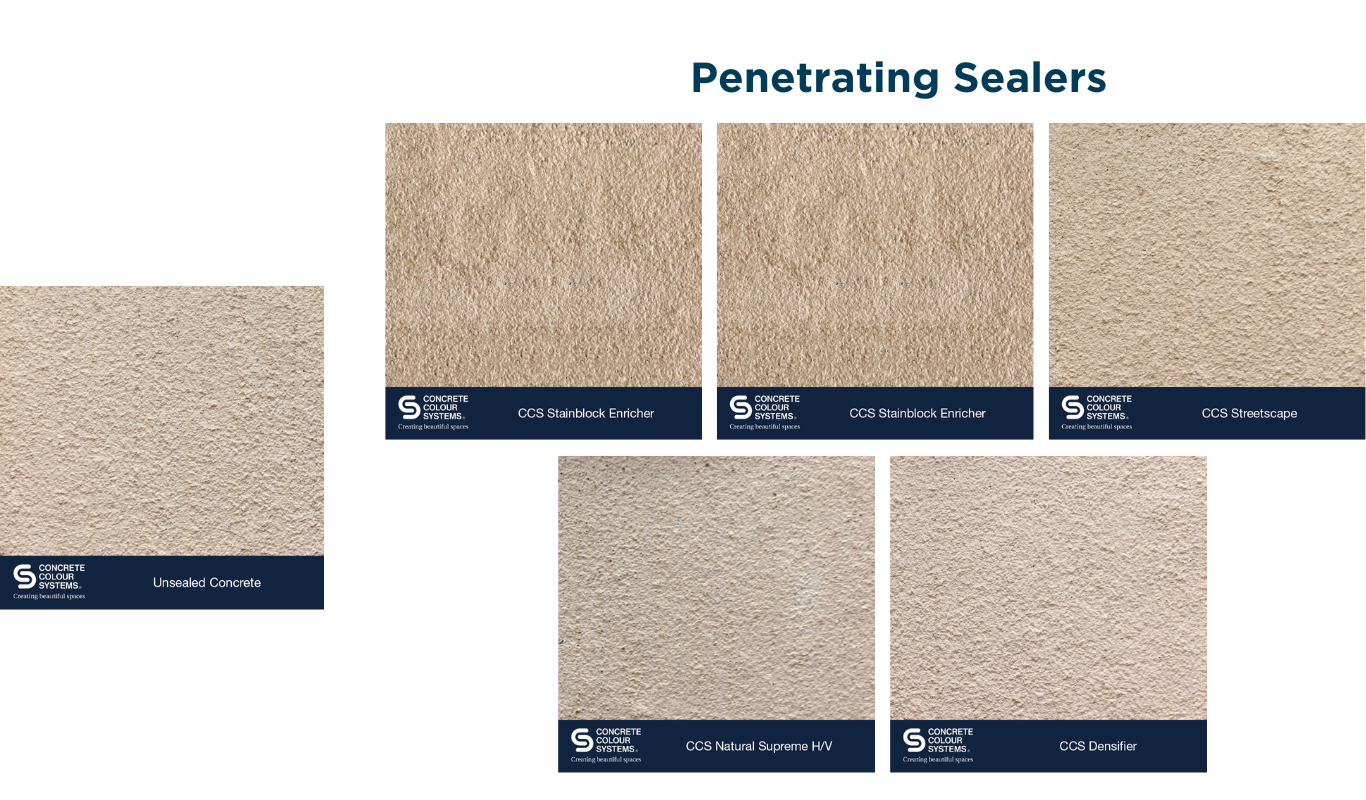
Surface coating sealers
Surface coating sealers, also known as film forming sealers, coat the entire concrete surface with a film. This sealer works by filling the pores of the concrete as well as leaving a layer of sealer on the surface. Film forming sealers often enrich the colour of the surface and are available in matt to high gloss finishes depending on your preference. The film that sits on top of the surface provides superior protection and is great for areas that experience high traffic.
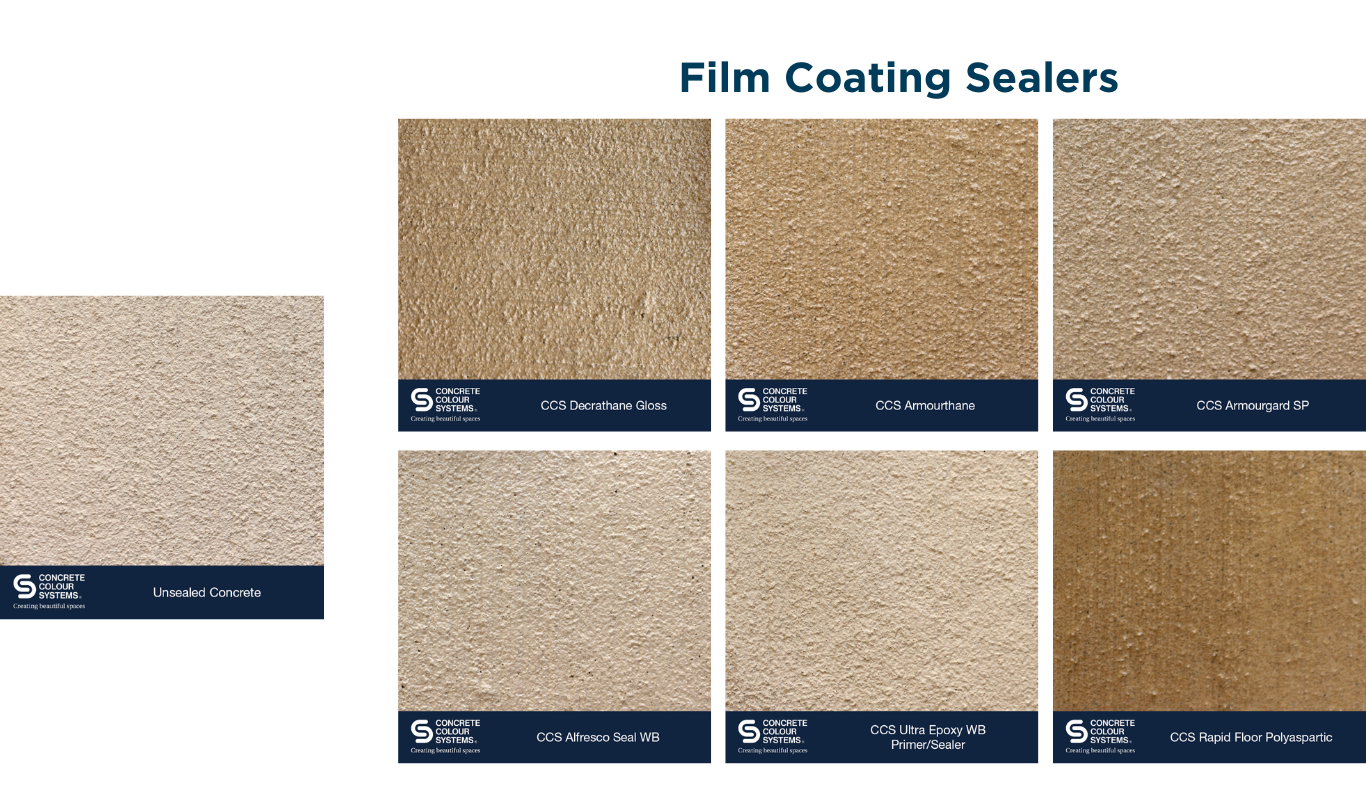
Benefits of sealing concrete
Sealing your concrete surface not only helps to protect against stains and marks, it also makes concrete maintenance much easier. Let’s look at the benefits of sealing your concrete surface.
- Sealing enhances the appearance of your project and ensures it looks fresh and attractive all year round.
Whether you choose a penetrative sealer which maintains the surface finish or a film forming sealer that coats and enhances the surface, it will look beautiful all year.
- Assists in preventing dirt, grime, salt, oils, graffiti, and other contaminants from penetrating and damaging the surface.
The sealers penetrate or coat the pores of the concrete which makes it harder for dirt and pollutants to fill the holes and make the surface look dirty.
- Creates a durable surface that is easy to maintain and keep clean.
The sealer creates a barrier between the concrete and spill which helps prevent staining for an extended period, giving you more time to clean the spill. For any spills that have stained the surface, it is significantly easier to remove them thanks to the sealer.
- Protects the surface from harsh weather conditions.
With wild weather comes strong winds causing debris to fly around, however when there is a sealer on your concrete, the surface is stronger with its added layer of protection to avoid any damage.
- Assist in the prevention and accumulation of lime deposits and inhibits growth of mold and algae.
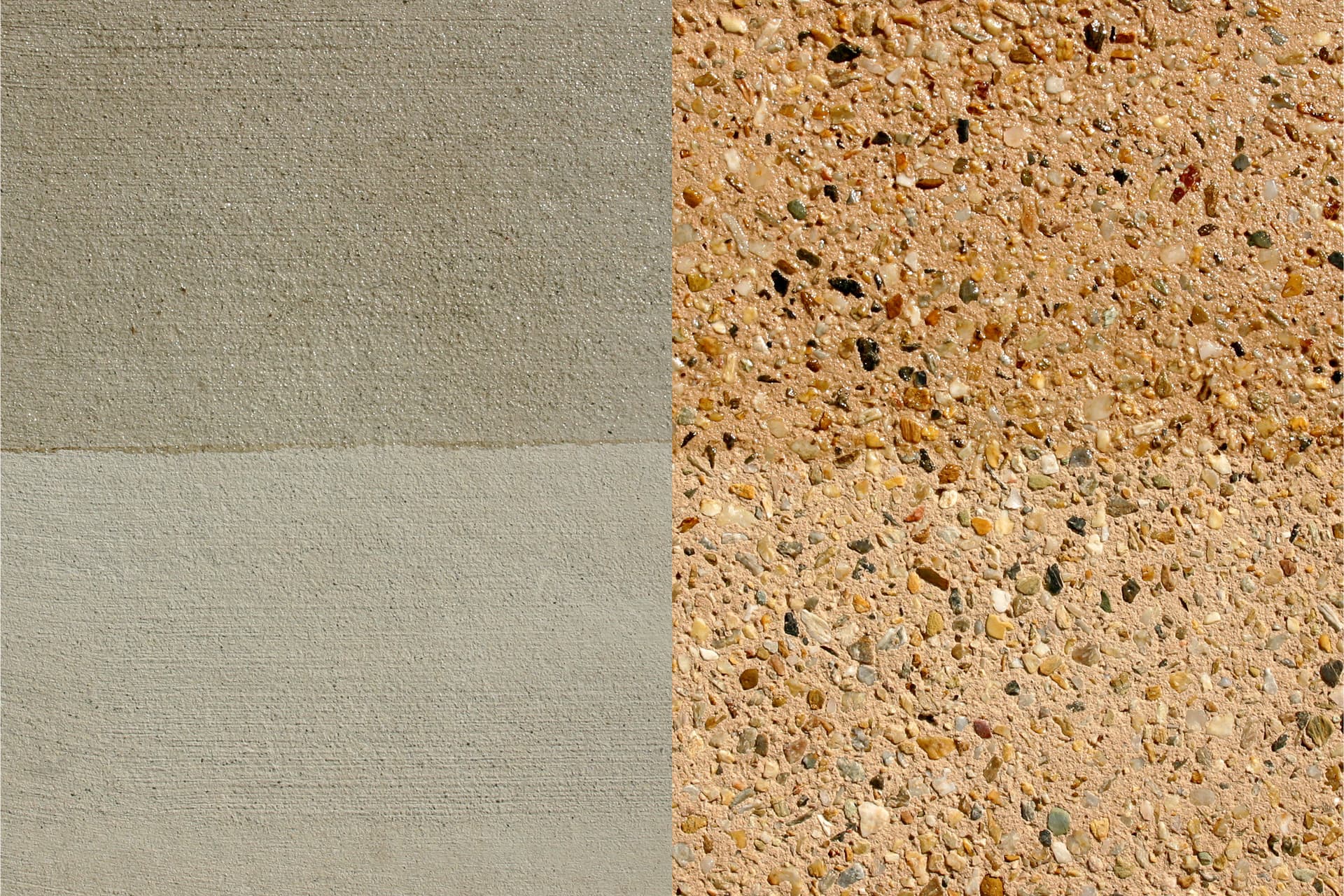
As you can see in the above images, there is a portion of the surface which has a wet look/shine. This shiny section is a sealer on the surface of the concrete. As mentioned above, different sealers can provide different levels of shine from a matt finish up to a high gloss. Sealers can also influence the colour of the surface, with a high gloss intensifying the surface colour.
Maintaining and caring for your concrete surface
Now that you are invested in sealing your decorative concrete surface, it is essential to understand how to maintain and care for it. Sealing will help prevent stains and mould, but it is still important to clean spills and stains quickly. We have detailed our best practice guide for successful concrete maintenance.
- Dust, dirt, and grime.
A garden blower, soft broom or sweeper is ideal for gently removing dust, dirt and debris from the surface.
- Cleaning up a spill.
Try to clean any spills on the surface as soon as possible to prevent any absorption into the surface. The sealer will be working to repel the spill, but the earlier the spill is cleaned, the easier it is to prevent any staining or sealer degradation.
- Food, water, and oil stains.
For residential areas: use a clean mop with clean water and a gentle cleaner with a PH between 7-7.5 and wash over the stains until they have lifted. Rinse the surface with clean water to remove any leftover cleaning residue.
For larger commercial areas: use a gentle low/no foaming cleaner with a PH between 7-7.5 with an automatic floor scrubbing machine with soft, gentle pads.
Note for all surfaces: A gentle cleaner will help lift the dirt particles allowing for easier removal, compared to only using water which leaves the particles on the surface and can lead to discolouration.
- Cleaning solutions.
Make sure to check the working time of your cleaner to ensure there is enough time to successfully remove the dirt and grime from the surface. If there isn’t enough time, the dirt and grime will simply move around the surface, rather than be removed. Once cleaned, wash the surface with clean water to ensure no cleaning solution is left.
Sealing your concrete will provide you with several benefits such as easy cleaning and maintenance and a long-term beautiful finish. When thinking about what sealer is right for your concrete, consider the finish you want to achieve (natural and matte or rich and enhanced) and the final use of the concrete. Concrete that has cars parking or driving on it might require a different sealer to a concrete footpath. No matter the sealer, they will all help prevent spills from staining the surface and make cleaning much easier to complete.

